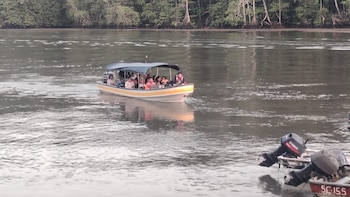Ukrainian families evacuated from the besieged city of Mariupol describe the “hell” they left behind, bodies accumulating on the streets and cold nights in basements to protect themselves from bombs, with temperatures below freezing.
While Russian forces were bombing the city, they had to melt the snow to drink water when food was scarce and there was no electricity.
“They fired so many rockets,” recalls Tamara Kavunenko, 58, in statements to AFP. He is one of 4,300 Mariupol residents who escaped this week in Zaporiyia, central Ukraine.
“When the snow came, we picked it up and melted it to get water. When that's not the case, you boil the water in the river to drink it,” he says.
“In the streets are the bodies of many civilians killed,” he adds, before pronouncing the sentence: “It is no longer Mariupol. It's hell.”
More than 2,000 people have died so far in the port city, a key strategic target for Moscow, according to Ukrainian authorities.
On Thursday, Ukraine accused Russia of bombing a theater where hundreds of civilians had taken refuge, even though the word “children” was written on the front and back of the building, according to satellite images captured on March 14 by private company Maxar.
- “The smell in the air” -
About 6,500 vehicles have left the city in the past two days, Vadim Boychenko, the mayor of Mariupol, said in Telegram early Thursday.
In the midst of the telecommunications outages, many of them escaped.
At a Soviet-era circus in Zaporiyia, a group of Red Cross volunteers await evacuees. Children's shoes and blankets cover the floor.
Dima, whose hands are black with dirt, tells AFP that it has not been cleaned for two weeks. On his third attempt, he arrived in Zaporiyia on Tuesday with his wife and two children, he told AFP.
To feed the children and their grandparents, she explains that she had to loot stores in search of food.
“We lived underground and if it was -4º it was a good temperature,” he says, raising his leg to show that he is wearing three pants to warm up.
“Sometimes there were bodies on the street for three days,” he recalls.
“The smell is in the air and you don't want your children to smell it,” he adds.
Daria, who also fled Mariupol, said that for 10 days she lived in the basement of her apartment building with her baby.
“It was getting worse by the day,” she says, while holding her daughter.
“We were without electricity, without water, without gas, without means to exist. It was impossible to buy things,” he adds.
- “Tired, Sick, Crying” -
Marina, a Zaporiyia Red Cross volunteer, said the evacuees arrived in a very bad condition.
“They were tired, sick, crying,” he said. The mall now offers them a roof over their heads and the opportunity to swim. “We're taking care of them,” he says. “Everything is ready for them,” he adds.
The only way to escape was to use a private car. Many of those who arrived say that they were unable to leave the shelters because of the bombings and that they found a way to travel, fortunately, since there was no telephone or internet signal either.
“We saw that there were people with white ribbons [in their cars] leaving,” said one woman, who introduced herself as Darya. He says he asked a neighbor if he could get together to get away.
For some, the trip to Zaporiyia, which usually lasts about three or four hours, took more than a day.
A father of two said he managed to pick up the signal after turning on the radio, so he had information about the humanitarian corridor.
While hugging his young son, Dmitri says they spent “nine or 10 days” hiding in the Mariupol theater, the same one that was bombed according to Kiev by Russian forces.
bur/jm/jv/sag/mis
Últimas Noticias
Debanhi Escobar: they secured the motel where she was found lifeless in a cistern
Members of the Specialized Prosecutor's Office in Nuevo León secured the Nueva Castilla Motel as part of the investigations into the case

The oldest person in the world died at the age of 119
Kane Tanaka lived in Japan. She was born six months earlier than George Orwell, the same year that the Wright brothers first flew, and Marie Curie became the first woman to win a Nobel Prize

Macabre find in CDMX: they left a body bagged and tied in a taxi
The body was left in the back seats of the car. It was covered with black bags and tied with industrial tape
The eagles of America will face Manchester City in a duel of legends. Here are the details
The top Mexican football champion will play a match with Pep Guardiola's squad in the Lone Star Cup

Why is it good to bring dogs out to know the world when they are puppies
A so-called protection against the spread of diseases threatens the integral development of dogs




